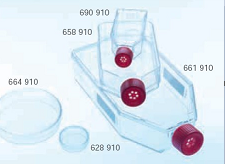Roche and BioLamina Start Collaboration to Develop Novel Cell Culture Systems

Research focus on investigation of laminin-based approaches
Penzberg, Germany and Stockholm, Sweden, March 6, 2013 / B3C newswire / - Roche (SIX: RO, ROG; OTCQX: RHHBY) and BioLamina, Stockholm, Sweden today announced the signing of a research and development agreement to jointly develop new cell culture systems for various applications, including stem cell research. The collaboration will focus on assessing laminin-based in-vitro cell culture matrices offering highly physiological microenvironments for living cells. Under the terms of the agreement Roche will provide R&D funding and scientific expertise to BioLamina. Financial details were not disclosed.
Laminins are proteins located in the extracellular matrix providing the stability essential for cell growth and behaviour. They are the only protein group in this environment that have a tissue-specific distribution, including expression of specific laminins during embryonic development. This makes them a very interesting target for new biologically relevant cell culturing techniques.
“Our aim is to develop laminin-based culture systems that provide biologically relevant, standardized environments”, said Ruedi Stoffel, Head of Biochemical Reagents & Custom Biotech at Roche. “We are looking forward to this collaboration to build on the revolutionary cell cultivation techniques developed by our colleagues at the Karolinska Institute and BioLamina.”
“We’re delighted that Roche has recognized the potential of our products and technology, which we believe will significantly complement their expertise and capabilities in cell culturing,” states Kristian Tryggvason, CEO of BioLamina. “By resolving many of the technical obstacles currently blocking the road to modern cell therapy, we expect this collaboration to accelerate the development of innovative cell culturing solutions that possibly can enable cell therapy”.
Related News
-
News BioNTech to begin mRNA vaccine manufacturing in Rwanda by 2025
German biotechnology company BioNTech has stated their intentions to begin production at their mRNA vaccine factory in Rwanda by 2025, which will mark the first foreign mRNA vaccine manufacturing site on the continent of Africa. -
News Identifying Alzheimer’s Disease biomarker proteins with whole blood tests
A University of Manchester spin-out pharmaceutical company, PharmaKure, has reported successful study results for the quantification of Alzheimer’s Disease biomarker proteins with a whole blood test. -
News Bill & Melinda Gates Foundation to boost mRNA vaccine initiatives in Africa with USD $40m
To address vaccine inequality and accessibility issues, the Bill & Melinda Gates Foundation aims to deliver USD $40m to various biotech companies and vaccine manufacturers in support of mRNA vaccine development. -
News CPHI Podcast Series: Exploring neurological frontiers in Alzheimer's and beyond
The next episode of the CPHI Podcast Series delves into the science and background behind some recent developments in the field of Alzheimer's disease and neurological disorders. -
News Is patient centricity the future of pharmaceutical manufacturing?
In this interview with Sandra Sánchez y Oldenhage, President of PharmAdvice, she speaks to the importance of considering patients in the manufacturing stages of the pharmaceutical supply chain, and how it can redefine healthcare. -
News CPHI Podcast Series: How to leverage AI for Drug Discovery
Artificial intelligence is the topic of debate in the latest episode from the CPHI Podcast Series, where Digital Editor Lucy Chard speaks with Bill Whitford of DPS Group about the integration of AI in healthcare. -
News Pfizer forges ahead with blood cancer therapy after approval from FDA
Pfizer gains accelerated approval from the US FDA for their new bispecific antibody therapy for multiple myeloma, set to address an unmet need for patients. -
News Alzheimer's drug donanemab deemed effective in landmark clinical trial
Results from the TRAILBLAZER-ALZ 2 Randomised Clinical Trial into the use of donanemab to treat early symptoms of Alzheimer’s disease have been analysed.
Position your company at the heart of the global Pharma industry with a CPHI Online membership
-
Your products and solutions visible to thousands of visitors within the largest Pharma marketplace
-
Generate high-quality, engaged leads for your business, all year round
-
Promote your business as the industry’s thought-leader by hosting your reports, brochures and videos within your profile
-
Your company’s profile boosted at all participating CPHI events
-
An easy-to-use platform with a detailed dashboard showing your leads and performance







